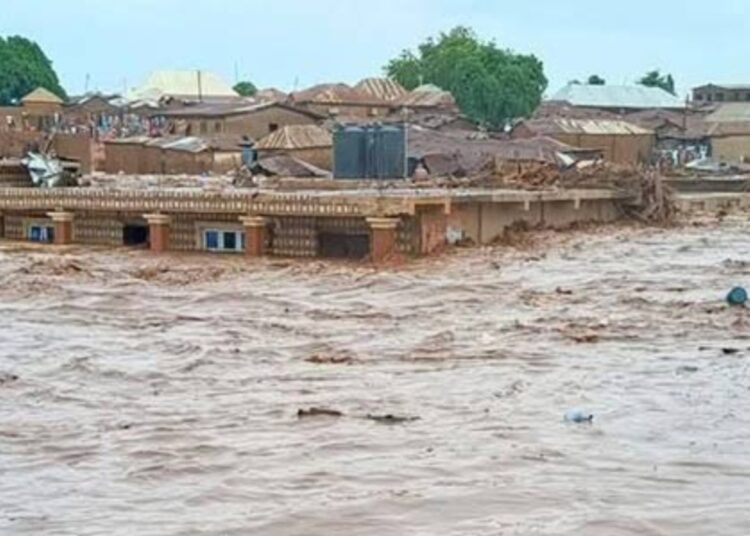The devastating flood that submerged Mokwa in Niger State on May 28, 2025, claiming at least 200 lives and displacing over 3,000 households, is a damning indictment of Nigeria’s chronic failure to address predictable catastrophes.
When President Bola Tinubu expressed being “personally saddened” by the tragedy and promised federal intervention, his words, while necessary, ring hollow against the backdrop of decades of similar promises followed by minimal action.
The Mokwa disaster, like the floods that kill over 1,200 Nigerians annually, was not an act of God but a consequence of systemic negligence that transforms seasonal rainfall into mass casualties.
The scale of destruction in Mokwa is staggering. Beyond the human toll – 200 confirmed deaths, over 500 missing persons, and 121 injured – the flood destroyed 265 buildings, several critical infrastructure, including the Mokwa bridge, and severed entire communities from emergency assistance.
The haunting image of excavator teams removing bodies trapped under debris and the palpable fear of epidemics from decomposing corpses paint a picture of a preventable humanitarian catastrophe.
When a popular Islamic school lost 40 pupils aged between eight and 16 years, and families were entirely wiped out, we must ask: how many more Mokwas will it take before Nigeria moves from reactive sympathy to proactive prevention?
This tragedy was not unprecedented. Just weeks earlier, on April 16, flooding caused by water release from the Jebba Hydroelectric Power Station killed 13 people and displaced over 6,400 others. This marked the sixth flood caused by the same dam, establishing a clear pattern of preventable disasters. The National Emergency Management Agency (NEMA) and state authorities were aware that Niger State falls among the 30 states at high flood risk, with over 1,200 communities in immediate danger.
Despite these warnings, no meaningful preventive measures were implemented. Instead, Nigeria continues its tragic cycle of waiting for disasters to strike before mobilising emergency responses.
The root causes of Nigeria’s flooding crisis extend far beyond heavy rainfall. Poor drainage systems, weak infrastructure, and haphazard urban planning create perfect conditions for catastrophic flooding in both rural and urban areas. The release of water from the Jebba dam without adequate early warning systems or downstream protection measures demonstrates how critical infrastructure, meant to serve the people, becomes an instrument of destruction.
When dam management repeatedly contributes to flood-related deaths, it exposes fundamental failures in operational protocols and emergency preparedness that demand immediate overhaul.
More troubling is the government’s consistent response pattern: express condolences, deploy emergency aid, promise better preparedness, then forget until the next disaster strikes.
In our view, the federal government’s warning that 15 million Nigerians face high flood risk across 30 states should have triggered massive infrastructure investment and comprehensive flood management strategies.
Instead, communities remain vulnerable to predictable annual disasters that government agencies know are coming but consistently fail to prevent.
The humanitarian impact extends beyond immediate casualties. The 503 affected households in Mokwa face long-term displacement, economic devastation, and psychological trauma. Children who survived the floods will carry these scars throughout their lives, while communities that lost entire families struggle to rebuild not just homes but their social fabric.
The collapse of bridges and roads compounds the tragedy by isolating survivors from essential services and economic opportunities. The Niger State government’s response of distributing 6,000 bags of rice underscores the vast gap between the scale of need and available resources.
Early warning systems exist on paper but fail to translate into community-level preparedness. The National Orientation Agency’s directive to “intensify public sensitisation efforts” represents the government’s default position of shifting responsibility to citizens rather than addressing systemic infrastructure deficiencies.
International best practices demonstrate that flood disasters are largely preventable through proper planning, infrastructure investment, and early warning systems. Despite greater flood exposure, countries like the Netherlands and Bangladesh have dramatically reduced casualties through comprehensive flood management strategies.
Nigeria possesses the technical expertise and financial resources to implement similar solutions but lacks the political will to prioritise long-term prevention over short-term electoral gains.
Nigeria needs a paradigm shift from reactive emergency response to proactive risk reduction. This requires establishing community-based early warning systems, mandatory flood insurance programs, and regular disaster preparedness drills.
The National Emergency Management Agency must evolve from a crisis response organisation into a comprehensive disaster risk reduction agency with powers to enforce building standards and coordinate prevention efforts across all government levels.
The Mokwa tragedy occurred in a context where Nigerian lives seem perpetually expendable to preventable disasters. When flooding kills over 1,200 people annually in a country with substantial oil revenues and technical capacity, it reflects not natural inevitability but policy choices that prioritise other expenditures over citizen protection.
The federal government’s promise to “ensure no Nigerian is left behind” must translate into concrete infrastructure investments and systemic reforms rather than emergency rice distribution.
As Nigeria mourns the Mokwa victims, the most fitting tribute would be ensuring such tragedies never recur. This requires political leaders to move beyond condolence messages toward comprehensive flood prevention strategies. Until Nigeria treats flood management with the urgency it reserves for political crises, annual disasters will continue claiming thousands of lives while government officials will continue to engage in their ritual of expressing ‘deeply felt’ condolences before moving on to other priorities.





